orty years ago, Shannon Morgan was living the American dream. She had two talented children, a surgeon for a husband, a carriage house near Boston and an Ivy League medical degree.Today, at age 67, she is homeless.
Read Morefeatured work from my portfolio
It was an audacious crime characterised by its grand scale and meticulous synchronisation. Criminals had plundered ATMs in 28 different countries, including the United States, the UK, the United Arab Emirates and Russia. It all happened in the space of just two hours and 13 minutes - an extraordinary global flash mob of crime.
Millions of dollars are stolen from ATMs at the same time in 28 countries. An army of money mules stuff the cash into bags. Do they know who they are really working for? In just over two hours, the thieves take nearly $14 million - all from the accounts of Cosmos Bank in India.
The hackers are back – and they are accused of being more dangerous than ever. Their cyber-attacks are getting more sophisticated and audacious. It’s claimed they are getting away with billions. North Korea denies everything.
Lazarus Heist live
A special episode recorded in front of an audience in New York. What’s it like working in North Korea? How are hackers tracked in real time? #LazarusHeist
It’s a frightening prospect for an unvaccinated, undernourished nation of 25 million people. But bad news does not escape North Korea without a reason. Finally acknowledging a viral outbreak may be part of a strategy by its leader, Kim Jong-un, to re-engage with the outside world. The world should be ready to engage, too.
If it seems as if North Korea wants us to sit up and pay attention — Don’t forget, we’re still building missiles and nuclear weapons! — that’s certainly one of its objectives.
But these tests are about a lot more.
In 2016 North Korean hackers planned a $1bn raid on Bangladesh's national bank and came within an inch of success - it was only by a fluke that all but $81m of the transfers were halted, report Geoff White and Jean H Lee. But how did one of the world's poorest and most isolated countries train a team of elite cyber-criminals?
“I was terrified.” Panic in Hollywood, careers ruined and helium filled balloons sent to North Korea. President Obama makes clear who he blames for the Sony hack.
A movie, Kim Jong-un and a devastating cyber attack. The story of the Sony hack. How the Lazarus Group hackers caused mayhem in Hollywood and for Sony Pictures Entertainment. And this is just the beginning…
The most daring bank theft ever attempted? From hacking Hollywood to a billion-dollar plot. Premieres 19 April 2021. With Geoff White and Jean Lee.
My family’s wartime tale is not particularly remarkable; their harrowing experience could be told a million times over. This is not a tale of military heroism, or even one of selfless sacrifice. It is simply the story of one family of ordinary Koreans who survived the three cruel and crushing years of war that killed nearly a million South Korean civilians.
As other countries hurtle toward disaster, South Korea looks like the safer and smarter place to be. So what can other governments learn about how to handle coronavirus?
by Jean H Lee / March 27, 2020
Bong “came of age just as South Korea was making the transition to the First World and as the internet brought the world to Seoul. His influences are broad and worldly, and his movies reveal a newfound sense of empowerment and independence as a South Korean. He made a South Korean film, set in South Korea, touching on South Korean issues — but informed by techniques and inspiration gleaned from influences around the world. I’m in awe of his vision — and his strength of mind in casting aside conformism to make a film that risked the disapproval of those who seek to portray South Korea in only a positive light."
What a difference a week makes when it comes to diplomacy with North Korea.
Earlier this month, one year after the dramatic Singapore Summit of June 2018, nuclear negotiations with North Korea appeared stuck in a standstill. Pyongyang was giving friends and foes the cold shoulder as leader Kim Jong Un remained in retreat following his failed second summit with US President Donald Trump in Hanoi in late February.
Then, in the span of just a few heady days from 20 June to 22 June, Kim not only hosted Chinese President Xi Jinping in a state visit that granted the young North Korean leader tremendous legitimacy but also revealed the exchange of another set of “love letters” with Trump.
In a flash, we went from fears of provocation to the first movement on the moribund nuclear negotiations with North Korea in months. With Trump heading to Asia for the G20 summit and high-level meetings with Xi, Japan’s Shinzo Abe and South Korea’s Moon Jae-in, we’re likely to hear calls for a third Trump-Kim summit as regional leaders seek to build momentum for renewed talks with North Korea.
And despite the head-spinning speed of developments, none of this comes as a surprise. Here’s why.
Fleeing war in North Korea in 1951, my aunt and her siblings scrambled aboard an American cargo ship pulling away from port, her parents and grandmother shouting their names to keep track of them in the chaos of the evacuation. They made it. But their grandfather stayed behind in Wonsan to protect the family property.
He thought his family would return. They never saw him, or the rest of their family in North Korea, again.
As the leaders of North Korea, South Korea and the United States discuss denuclearization and a possible peace treaty to formally end the Korean War of the 1950s, I wanted to check in with my aunt, a child of the war who was born in North Korea, and her millennial daughter Euni Cho, who grew up in democratic, thriving South Korea.
From bombs to Olympic banners: Can winter sports diplomacy stop a war in the Korean peninsula? North Korea's leader Kim Jong Un took the world by surprise with his announcement that his nation and South Koreawould unite under a single banner at the Winter Olympics. Was it a diplomatic masterstroke or a cynical stunt? Journalist Jean Lee pieces together what really led to this public relations coup.
North Korea’s participation in these Olympics runs the risk of rewarding bad behavior and handing Mr. Kim a diplomatic victory that he will brandish as proof that his strategy was right. Still, we have to start somewhere after so many years of tension.
Romance, humor, tension — everyone loves a good sitcom, even North Koreans. But in North Korea, TV dramas are more than mere entertainment. They play a crucial political role by serving as a key messenger of party and government policy. They aim to shape social and cultural mores in North Korean society. And in the Kim Jong-un era, they act as an advertisement for the “good life” promised to the political elite.
If President Trump thinks that his threats last week of “fire and fury” and weapons “locked and loaded” have North Koreans quaking in their boots, he should think again. If anything, the Mao-suit-clad cadres in Pyongyang are probably gleeful that the president of the United States has played straight into their propaganda.
While Kim Jong Un stares down his enemies abroad, it's easy to forget that he's also fighting a battle from within his own borders: to survive at all costs. Like any autocratic leader, he's under constant pressure to maintain order and allegiance. But his youth and inexperience make staying in power that much more of a challenge, which in turn requires absolute control. Opposition must be eliminated. No one is safe, not even his own family.
We in the United States often call the Korean conflict the “Forgotten War.” My high school history textbook in Minnesota devoted barely a paragraph to it, and growing up as the child of Korean immigrants, I knew almost nothing about a war my own parents survived as children. But the war is very much alive and present in North Korea, and the standoff with the United States figures prominently in their propaganda, identity, and policy.
After the 14th-century Korean ruler Taejo, founder of the Joseon dynasty, chose the youngest of his eight sons to succeed him, a spurned son killed the heir apparent and at least one of his other half brothers and eventually rose to the throne. Today, rumors of royal fratricide are again swirling, this time around the court of Kim Jong-un, the ruler of North Korea.
It was party time in Pyongyang. Workers scrambled to hang congratulatory banners in the lobby of the Koryo Hotel, my home away from home in the North Korean capital, where I was posted as an Associated Press correspondent. A gaggle of cooks, still in aprons and chef’s hats, dashed out from the kitchen to watch the festivities, and mothers tightened the pink bows in their daughters’ hair as the girls fidgeted in anticipation.
Two years after he made history by becoming the Navy's first black pilot, Ensign Jesse Brown lay trapped in his downed fighter plane in subfreezing North Korea, his leg broken and bleeding. His wingman crash-landed to try to save him, and even burned his hands trying to put out the flames.
A year after leader Kim Jong Un promised in a speech to bring an end to the "era of belt-tightening" and economic hardship in North Korea, the gap between the haves and have-nots has only grown with Pyongyang's transformation.
North Korean farmers who have long been required to turn most of their crops over to the state may now be allowed to keep their surplus food to sell or barter in what could be the most significant economic change enacted by young leader Kim Jong Un since he came to power nine months ago.
Her eyes well up when Li Pun Hui recalls her role in a historic example of "ping pong diplomacy."
"For 50 days, 24 hours a day, we lived together as one, trained together, slept in the same room and ate all our meals together," Li told The Associated Press at an interview in Pyongyang. "We shared the same food and our feelings."
For North Koreans, the systematic indoctrination of anti-Americanism starts as early as kindergarten and is as much a part of the curriculum as learning to count.
As the snow drifts through the towering evergreen trees, silence enshrouds this remote pilgrimage site, a place some here consider the Bethlehem of North Korea.
As North Korea celebrates the centenary of Kim Il Sung's birth, his past, like the misty peaks of Mount Paektu, remains veiled in myth.

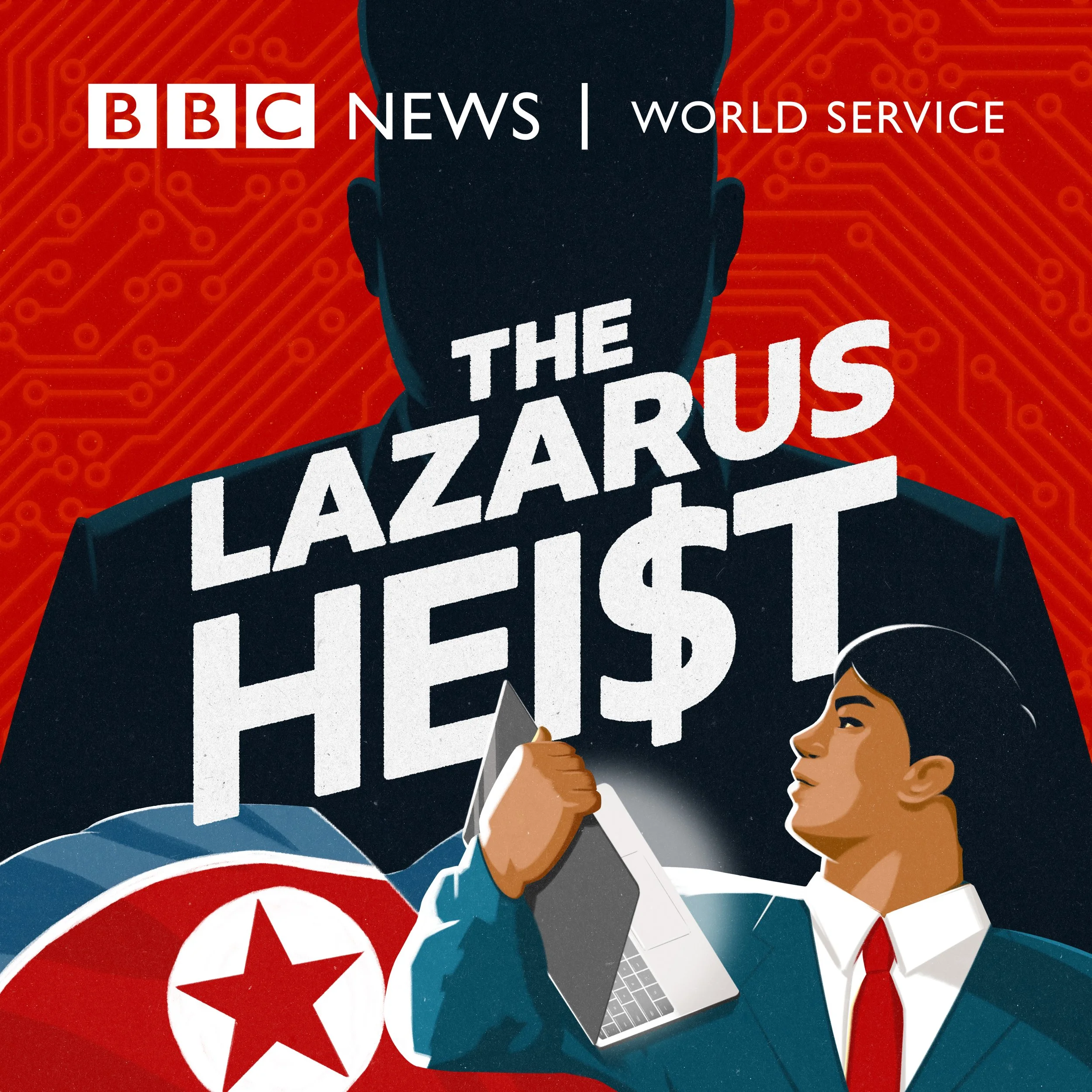

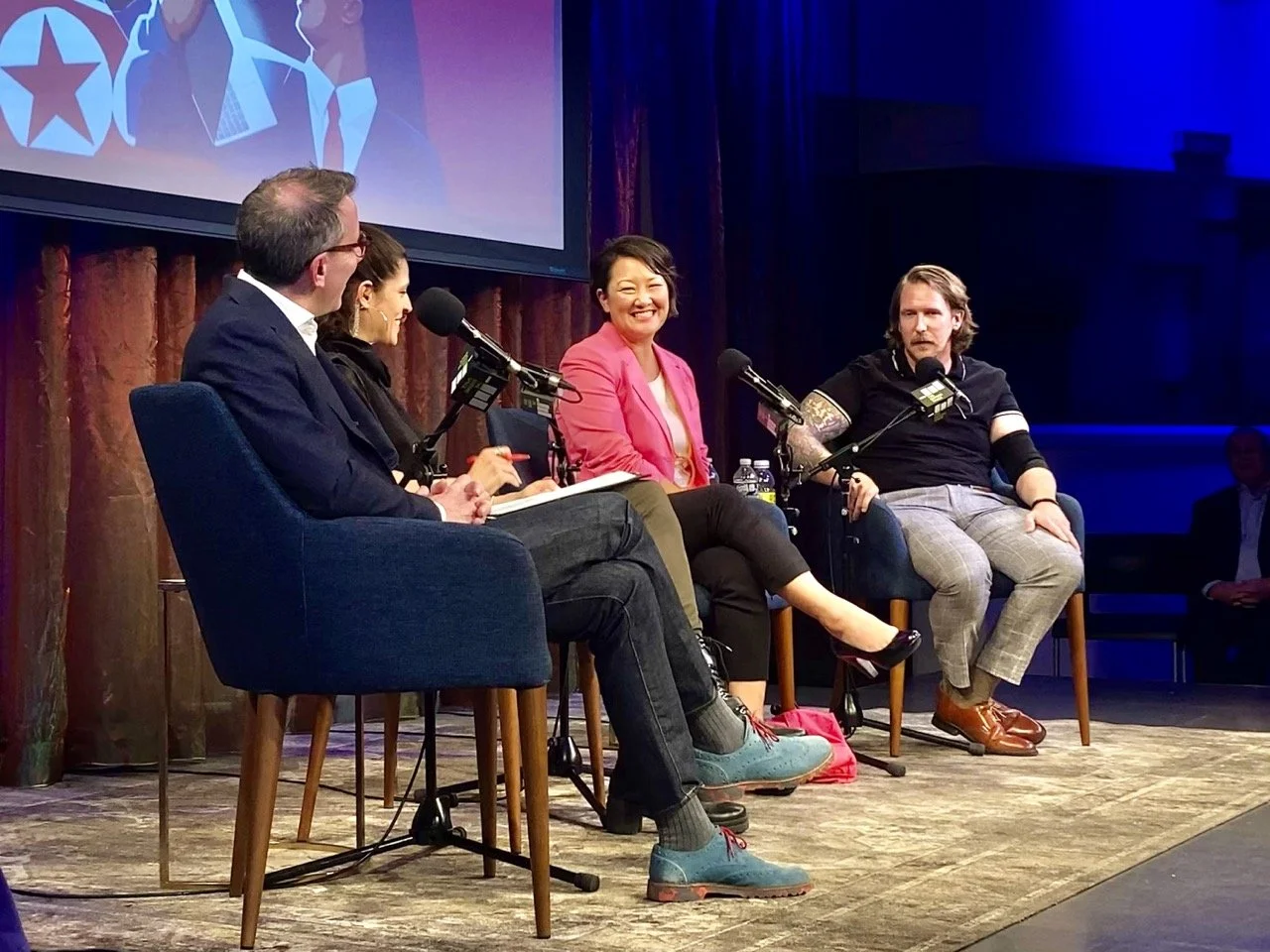


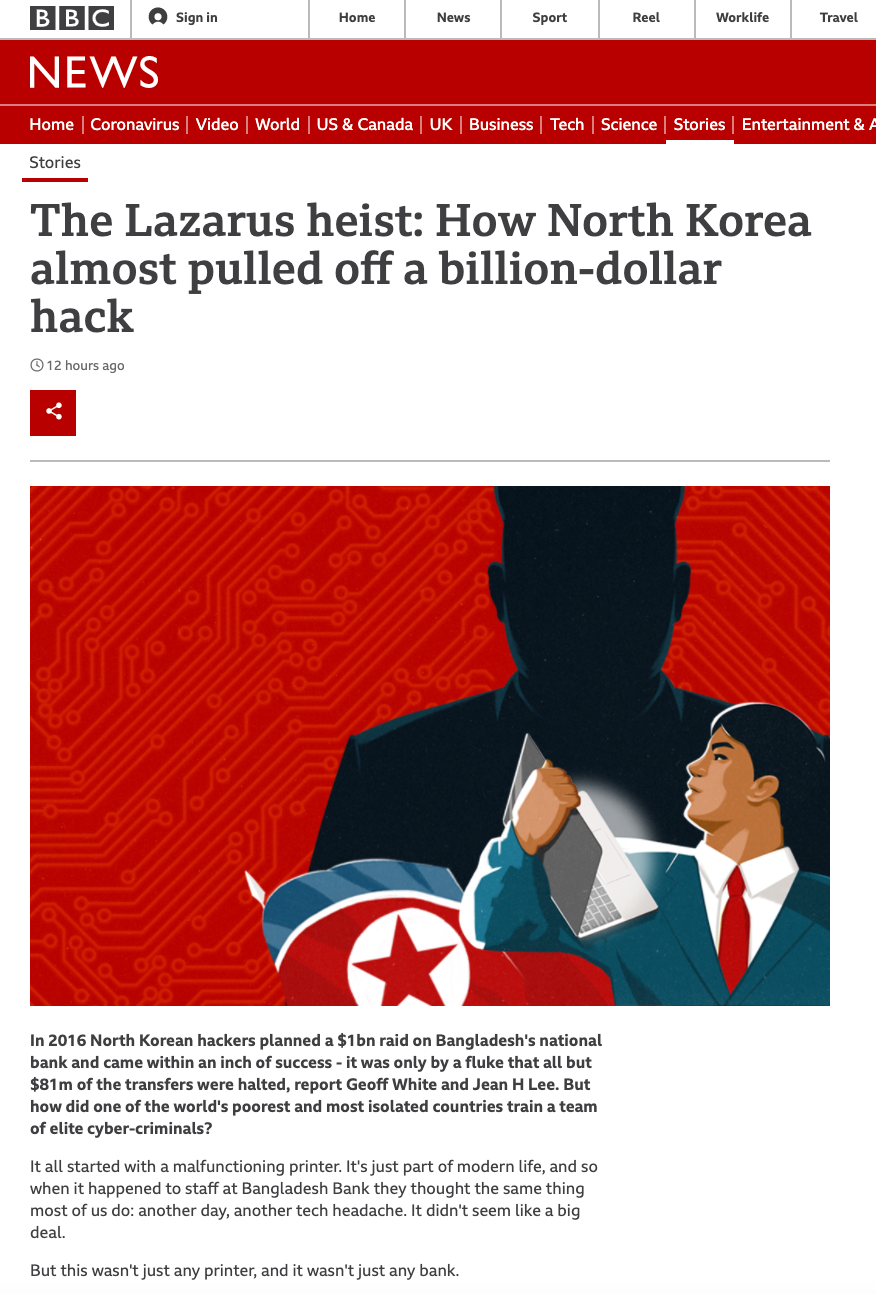
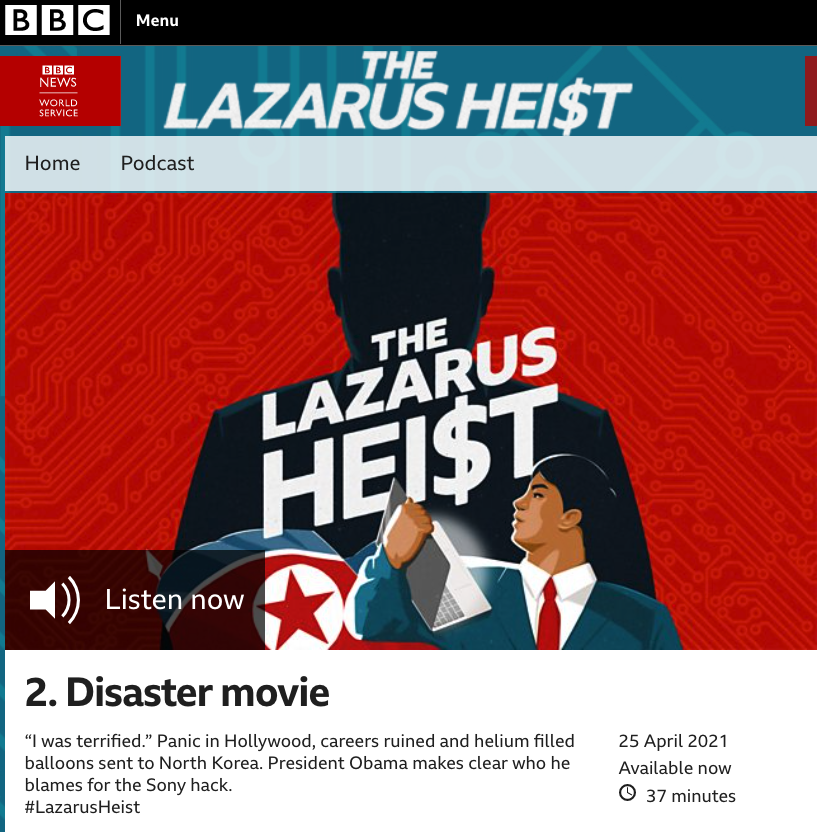












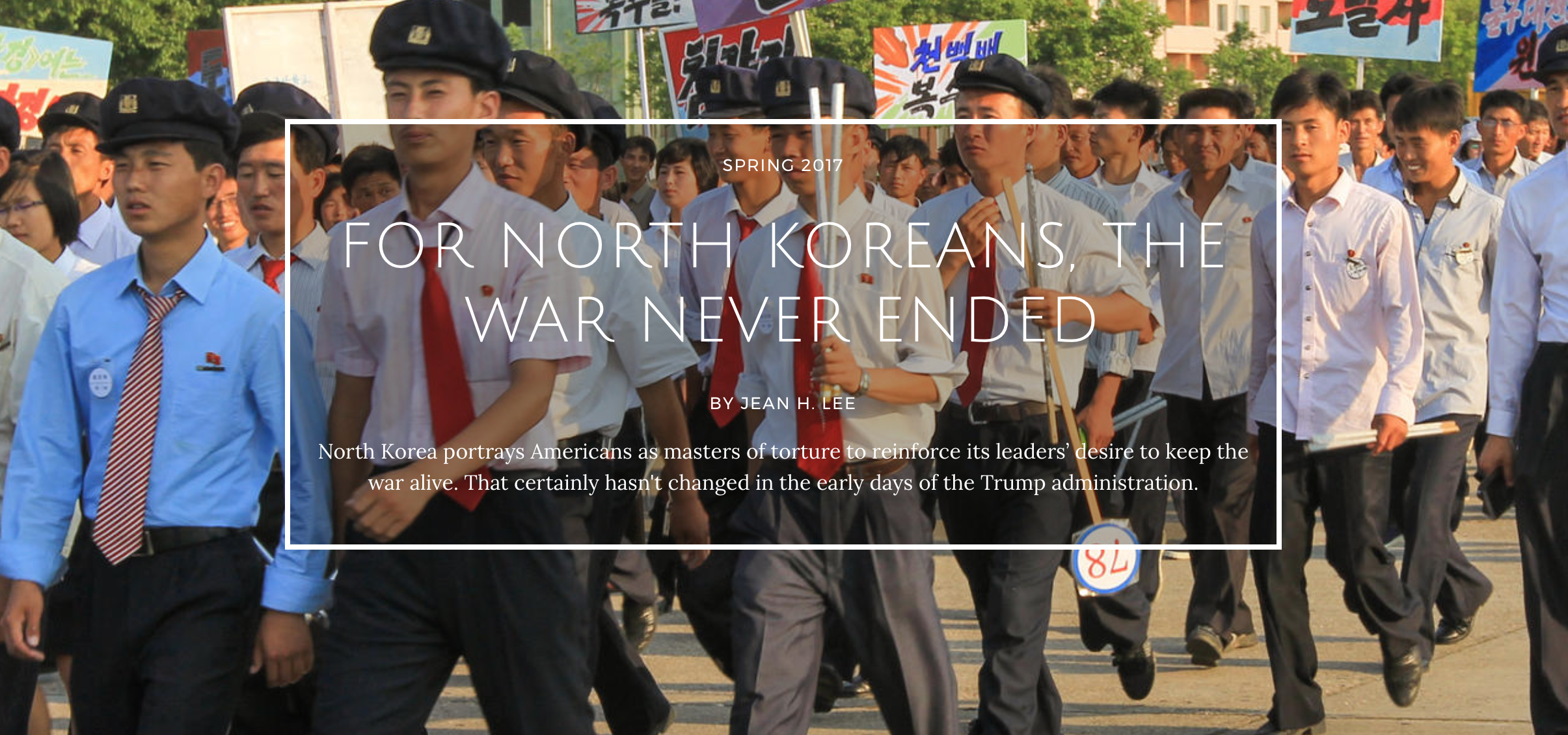


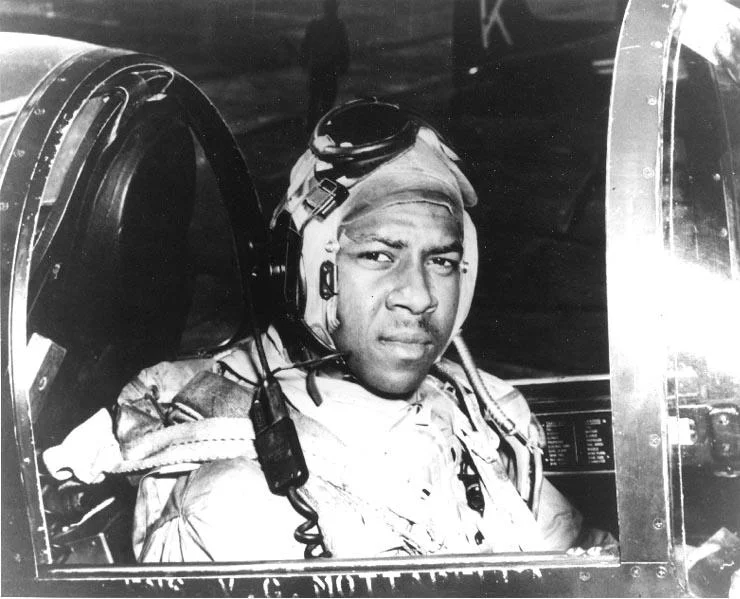
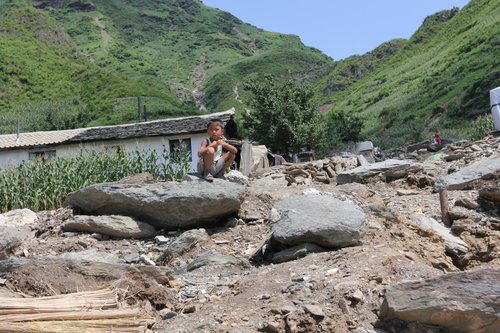




Download all episodes of The Lazarus Heist, watch Lazarus Heist animations, read our feature story about the hackers and view visualizations of the podcast episodes on Lazarus Heist homepage on the BBC World Service website!